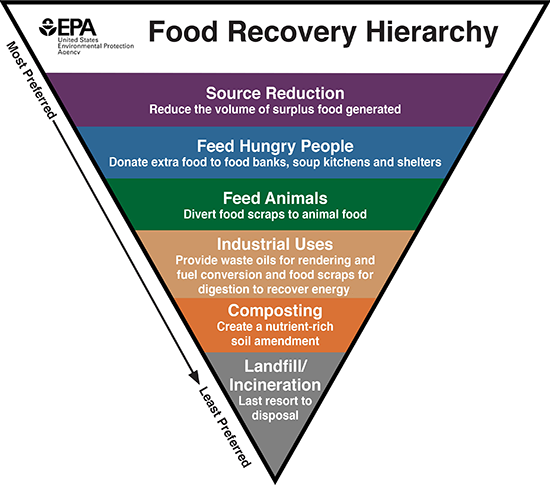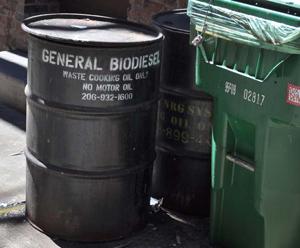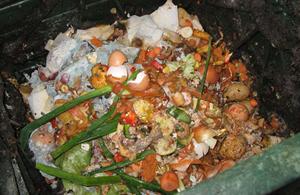Links and Resources About Food Recovery in Honolulu
 Click image to enlarge it.
Click image to enlarge it.
Learn about some food recovery alternatives in the Honolulu area. EPA’s Food Recovery Hierarchy prioritizes these food waste strategies from most to least preferable.
On this page:
Source Reduction
Source reduction is the strategy of preventing food from becoming waste in the first place. There are many resources available to tackle source reduction:
- U.S. EPA Food Recovery Website:
- Food and Packaging Waste Prevention Tool (spreadsheet): Tracks the amount and reasons specific foods are wasted.
- Reducing Wasted Food & Packaging A Guide for Food Services and Restaurants: Provides guidance on using the prevention tool tracking results to save money and reduce waste.
- Food Waste Assessment Guidebook: Shows how to do a one-time snapshot wasted food assessment.
- National Restaurant Association ConServe Program: Provides resources and tools to help restaurants through each step of a food waste reduction program; provides videos to accompany many of the EPA resources listed above.
- Leanpath: Company assists foodservice operations in reducing food waste, website provides many free tools, videos and case studies.Exit
- City of Honolulu Department of Environmental Services Business Recycling Resources:
- Lists “peer consultants” Exit who will offer free tours of their facilities and programs and how to plan similar programs; includes several restaurants and food preparers.
- Lists “peer consultants” Exit who will offer free tours of their facilities and programs and how to plan similar programs; includes several restaurants and food preparers.
Feed Hungry People (Donations)
The resources below include national, regional and local organizations which take food donations in the Honolulu area. Most take non-perishables, and some accept surplus perishable foods. Be prepared to describe your donations in terms of packaging, preparation, frequency and type.
- Aloha Harvest Food Rescue: Picks up and delivers perishable food the same day to feed the hungry.
- Food Pantries - Many have varying or limited capabilities for storing food donations and therefore limit the types or timing of donations. It’s often best to contact several to determine which can use your donations. Below are links to find local food pantries.
- Ample Harvest: Find a pantry near you on this non-profit's website. Exit
- Food Pantries.org: See a list of Hawaii food pantries on this non-profit's website. Exit The following food pantry may accept perishable donations:
| Food Pantry | Contact | Hours |
|---|---|---|
| Salvation Army – Family Services Office | 1931 North King Street Honolulu, HI 96819 (808) 841-5565 |
Wednesday & Friday: 1:30 - 3:30 pm Call to confirm |
- Rock and Wrap It Up!: Website Exit; Matches vetted charities with eligible donors of perishable food including entertainment venues, hotels, K-12 schools and colleges, sports teams, and hospitals. Offers the free “Whole Earth Calculator” Exit to convert pounds of food to pounds of CO2 equivalent (CO2e).
- Sustainable America: Website EXIT; Locate Food Rescue organizations.
- ReFed Innovator Database: Website EXIT The Database is a living compilation of commercial and nonprofit entities turning the food waste problem into an opportunity for economic, social, and environmental impacts. This growing database is broken down by food waste solution type, organizational status, and geographic reach. Categories include secondary marketplaces that connect surplus food (food that would otherwise be wasted) to buyers. Food product creation organizations convert edible food that is currently considered waste (e.g., surplus/cosmetically challenged produce, brewery waste, vegetable trimmings) into value-added consumer food products (e.g., juices, fruit snacks, energy bars). The Database also list variety of food recovery organizations that capture edible food that would otherwise go to waste on farms, within the supply chain, or in consumer-facing businesses, and redistributes it to food insecure populations.
- Food Banks: Regional food banks work with local food pantries, homeless shelters and other charities for food donation. While many food banks are unable to accept perishable and prepared food, they often work with donors to find perishable food options nearby. Listed below is the main food bank in the Honolulu area.
| Donation Center | Location | Contact | Type of Food Accepted |
|---|---|---|---|
| Hawaii Food Bank Exit | 2611 Kilihau St. Honolulu, HI 96819 |
(808) 836-3600 | Non-perishables; sealed perishable foods, fresh produce. Cannot accept prepared foods, but will refer to agencies that can. |
| New Legal Guide |
|---|
|
New legal guide on Federal Enhanced Tax Deduction for Food Donation Exit (1) LIABILITY OF PERSON OR GLEANER – A person or gleaner shall not be subject to civil or criminal liability arising from the nature, age, packaging, or condition of apparently wholesome food or an apparently fit grocery product that the person or gleaner donates in good faith to a nonprofit organization for ultimate distribution to needy individuals. |
Feed Animals
Pig/Hog Farms: Large pig farms may accept food scraps. The Federal Swine Health Protection Act requires that food containing, or that comes in contact with meat or animal materials must be boiled before being fed to pigs. Consequently, many local pig farmers are primarily interested in single-stream fruits and vegetables or grain waste. Arrangements are often informal, and can be intermittent.
| Organization | Service | Contact |
|---|---|---|
| University of Hawaii Swine Specialist | Connects interested businesses in Honolulu with pig farmers able to accept their food scraps. | (808) 956-7594 |
| EcoFeed Inc. | Picks up and delivers food scraps to local pig farmers; contact for pricing | 1059 Makepono Street, Honolulu 96819, (808) 841-5586 |
Spent Brewery Grain: Spent brewery grain can be used as animal feed, primarily for cattle, but also for pigs, goats, fish and almost any livestock. Most breweries give the grain away to local farms. Manufacturers with single food waste streams can find local farms and ranches to donate their excess/by-product.
Industrial Uses
Fats, oils and grease, also known as FOG, can be converted to fuels and has various industrial uses. FOG and food scraps can also be anaerobically digested to create energy and the digestate can be composted to create a soil amendment. Honolulu area options and resources include:
- Waste to Biogas Resources: Searchable database of local biogas facilities that may accept FOG or food waste. The City of Honolulu wastewater treatment plants do not currently accept FOG or food waste for co-digestion.
- Pacific Biodiesel Logistics
- Restaurants for Renewables: Website Exit; Community-based FOG recycling program; (808) 877-3144
- Baker Commodities Inc./Island Commodities: Honolulu, (808) 682-5844; collects FOG
Food Scraps Composting
Composting turns food scraps into a nutrient-rich soil amendments and can be done on site in smaller amounts or on a larger scale at a municipal or commercial level.
-
Produce and Food Scraps Compost contact:City & County of Honolulu, Recycling Specialist - 768-3426, ssanbei@honolulu.gov.
- Find a Composter: Searchable database of local composting facilities Exit that may accept food waste; results from January 2015 search are included in the table below.
| Composting Facility | Location | Hours | Contact |
|---|---|---|---|
Baker Commodities:Exit
|
Island Commodities 91-269 Olai St Kapolei, HI 96707-793 |
Scheduled collection | (808) 682-5844 |
| Hawaiian Earth Products Exit(Ecofeed does all the pickups; accepts pre-consumer fruit, veggies, grain; no food scraps) | Hawaiian Earth Products (Campbell) 91-400 Malakole Road Kapolei, Hi 96707 |
Monday-Friday:7:00 am to 3:30 pm Saturday: 7:00 am to 3:30 pm Sunday: Closed |
Phone: (808) 682-5895 Fax: (808) 682-0762 |
Honolulu Food Recovery Successes:
- Kapiolani Community College uses commercial vermicomposting (worms) and specially designed and enclosed composting vessel for commercial foodscraps. Learn more on their website Exit
- Kona Brewing has spent grains picked up by local farmers to feed cattle, with the remainder used as an ingredient in the pub’s pizza and bread dough. They also send all kitchen scraps to local pig farmers and recycle all grease through local bio-fuel companies. Check out their website Exit
- Foodland Super Market has 30 stores (23 Foodland, 7 Sack N Save) on four major islands, and annually diverts 900,000 pounds of meat and seafood from 19 Oahu stores for agricultural feed, 670,000 pounds of produce scraps from 14 stores for pig feed, 300,000 pounds of organic waste from 5 stores for organic fertilizer, and 45 tons of food for donations to the Hawaii Food Bank. Find out more on their website Exit
Disclaimer: The information contained on these pages is intended to inform the public and does not establish or affect
legal rights or obligations. Links to non-EPA sites do not imply any official EPA endorsement of, or responsibility for, the
opinions, ideas, data or products presented at those locations, or guarantee the validity of the information provided.
Reference to any specific commercial products, process or service by trade name, trademark, manufacturer, or otherwise,
does not necessarily constitute or imply its endorsement, recommendation, or favoring by the United States Government
and shall not be used for advertising or product endorsement purposes.
